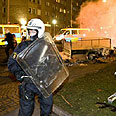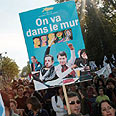


The Gaza operation may increase tremendously the danger for Israeli citizens and Jews living in different countries, even before mentioning the "promised revenge" by Hizbullah for the assassination of its commander Imad Mugniyah.
Brigadier-General (Res.) Elkana Har-Nof of the Counter-Terrorism Bureau believes that the global terror organizations don't need the Gaza operation in order to find reasons for their activities against Israeli targets.
Talking to Ynet, he stresses, however, that Operation Cast Lead may lead to a rise in a different type of threat – popular terrorism.
"The different between organized terror and popular terrorism is that the former may cause heavy damage and is led by extremely radical elements who also seek to create a great impact in the media.
"Popular terrorism, on the other hand, is led by citizens who are not affiliated with any army or organization. It's extremely difficult to warn against such incidents, which include stone throwing, stabbing attacks or even shootings. They may take place anywhere in the world where Jews and Muslims reside side by side," he says.
According to Har-Nof, the incident in Denmark shows the direct link between the Gaza operation and the fear of a rise in popular terrorism.
"Many Palestinians and Muslims worldwide are agitated following the current escalation and are ready to provoke and harm anything identified by them as Israeli."
"The threat is permanent and we are on constant alert regardless of the operation," says Andy David of the Foreign Ministry. "Since Mugniyah's assassination we have boosted security at all Israeli consulates worldwide, and the alert level has been unchanged since then.
"We must be on high alert, regardless of the current situation. One must not get into arguments, stay away from demonstrations and refrain from expressing openly one's Israeli identity."
'We'll soon know what's happening'
The military operation has yet to lead to a fundamental change in Israel's attitude towards threats directed at Jews and Israeli representatives abroad, but various communities have reported that the tensions between Jews and Muslims are rising.
"I have already gotten used to receiving threats from local elements," says Lena Posner –Körösi, president of Sweden's Jewish community.
"In Stockholm there is a constant feeling that something is happening. On the firs day of the Gaza operation there were already demonstrations on the street, and what happened in Denmark is likely to happen here as well at some point.
"Now it's relatively quiet here, but that's because of the Christmas break. We'll know exactly what's happening only when everyone goes back to work. In any event, we are preparing for the worst and are in contact with the local police. They are aware of the tension," she adds.
In Argentina, where Hizbullah carried out a terror attack at Buenos Aires' Jewish community building in 1994, things appear to be calmer.
"There has been anti-Semitism in Argentina for more than 100 years, and Israel does not have to act in order to prompt it," says chairman of the Jewish community association. "Several days ago there were protests of about 50 Palestinians, but it wasn't anything serious. We are not preparing in a different manner than usual."
In any event, Har-Nof believes that the fear of a wave of popular terrorism will fade away once the conflict in the Strip is over.
"At the end of the day, we are talking about Muslims who have interests of daily existence: Studying, making a living, living. Their willingness to endanger themselves will be reduced once things calm down a bit. I call on Israelis to tour the world all the time. We mustn't stay in a ghetto, but we must pay attentions to risks at any given time," he says.















